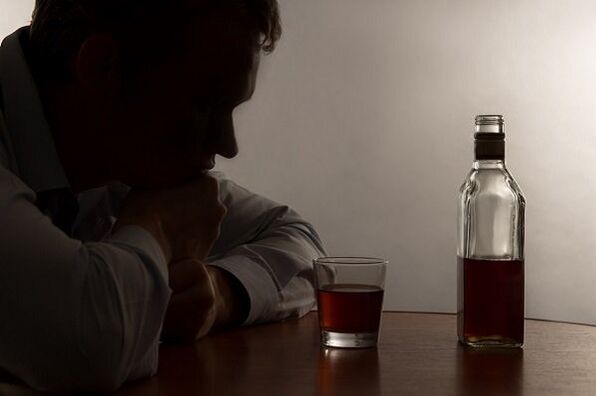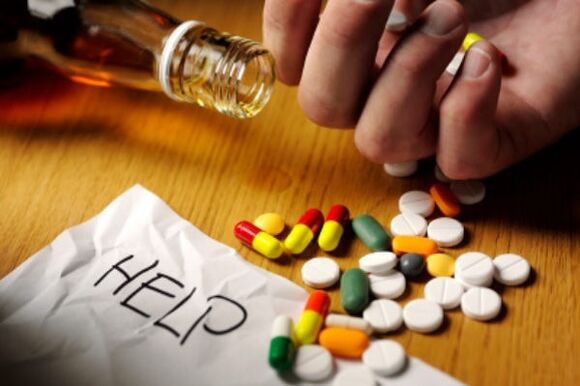Drunk people and their relatives believe that abruptly quitting drinking is much better and better than giving up a bad habit step by step. Such a method does not work equally effectively for everyone, and then people ask, how can you gradually stop drinking, causing minimal damage to your health?
Is it possible to quit drinking suddenly?
With the abrupt abandonment of alcoholics, they decided that drunks often failed, returning to their addiction again. In addition, alcohol dependence only increases as the body, after abruptly stopping its normal ethanol intake, tries to store it for later use.
People who have been drinking for a long time are so accustomed to the effects of alcohol on the body that a sharp rejection not only makes them feel uncomfortable, but also binds them even more to the bottle when they break it. In addition, such attempts to respond to addiction often affect a person’s physical and mental state of health, further exacerbating it. However, alcoholism is not a desire to drink, but rather a multi-level addiction whose abrupt abandonment leads to catastrophic consequences.
Important!It is possible to abruptly stop drinking alcohol if the addiction lasts for less than a year.

People with long-term alcoholism will not give up the "green snake" once and for all. Their throwing should be done gradually, ideally under the supervision of a narcologist. This is due to the fact that with a sharp rejection of the habit, chronic diseases can worsen, mental problems will develop that did not exist before. In order to prevent negative feelings of rejection from becoming the cause of alcohol consumption again, it is necessary to monitor doctors, support relatives and friends, and use a gradual rejection technique instead of a sharp separation from passions. In this regard, tools sold freely on the Internet also help.
What changes occur in the body
After quitting alcohol for the first time, feelings in a person can be subjectively unpleasant. This is due to the negative effects of ethanol on the body, as well as the fact that the drunk has not yet restored his health.

In the first weeks after the moments of rejection, a person may feel broken, often get sick, and experience depressive attacks. Such a reaction can be explained by a decrease in immunity and the fact that the body has not yet adapted to the new conditions and is trying to adjust everything to its normal course. During this period, people tend to grab the bottle again, convinced that it is better than being constantly ill.
Important!At first, there should be people besides the former alcoholic who can provide him with psychological support and explain that his health will return to normal as soon as the body is completely rid of toxins.
When the crisis is over and the body recovers, the former drunk will feel much better and be able to notice. Improvements appear in:
- increase the body's defenses;
- improving the condition of the skin;
- improving memory;
- stability in the work of the heart and blood vessels;
- normalization of digestive and urinary processes.
The condition of alcoholics does not improve as soon as they stop drinking. It takes time for the body to cope with the addiction. You need to remember this and not expect quick results.
Alcohol withdrawal syndrome
Drunks often refer to their fear of alcohol withdrawal when they protect their desire to drink. What is it and how can you stop drinking so that this unpleasant type of complication does not develop?
Withdrawal is the normal reaction of the human body to the sudden rejection of something. In the case of alcoholism, this manifests itself primarily in a dangerous condition such as delirium tremens.

Delirium tremens manifests itself in the fact that a few days after refusing to drink, one loses self-control. In this case, the following symptoms may occur:
- insomnia;
- panic attacks;
- hallucinations;
- he speaks aside.
In a state of such psychosis, the former alcoholic poses a serious danger not only to himself but also to those around him. Symptoms develop mainly in the evening and morning, while one is calm day and night.
Alcoholic psychoses have been shown to develop primarily in people who drink, who have been consuming alcohol for a long time, and who suddenly quit.
With the phasing out of harmful products consumed regularly, withdrawal syndrome very rarely develops. This is another reason to tie up with the "green snake" step by step.
Gradual failure is the key to success
If you drink for a long time and can no longer imagine yourself without a bottle of beer or a glass of vodka, doctors recommend asking for special help. A narcologist who comes to such a patient who realizes they have a problem will make recommendations for a gradual rejection of alcohol.
For chronic drunks, the best solution is gradual cessation. At the same time, it becomes possible to combine different methods of treating addiction, ranging from medication to psychotherapy sessions.
Gradual failure consists of several stages.
- First, one must accept the existence of the problem and be prepared to deal with the problem. This stage is one of the most difficult, as alcoholics often do not consider themselves sick of anything.
- Second, you need to overcome your pride and see a doctor. This stage can also be difficult for addicts, as it means acknowledging that they have weaknesses that they have to deal with.
- Third, a consistent and gradual fight will be needed. To do this, you need to follow your doctor’s recommendations, avoid drinking companies, radically change your outlook on life.

If a person gradually stops drinking, they are much more likely to cope with their addiction once and for all. In this case, the body manages to adapt to the changes, gets rid of the accumulated toxins, develops new positive habits in place of the negative old ones.
Gradual refusal to consume alcohol is an option for people whose addiction has already reached a chronic stage when it is impossible to abruptly stop drinking. With such a method, getting rid of addiction will require medical advice, a positive attitude and perseverance, and the support of loved ones. The more responsible a person’s need to stop drinking is, the more likely they are to succeed.































